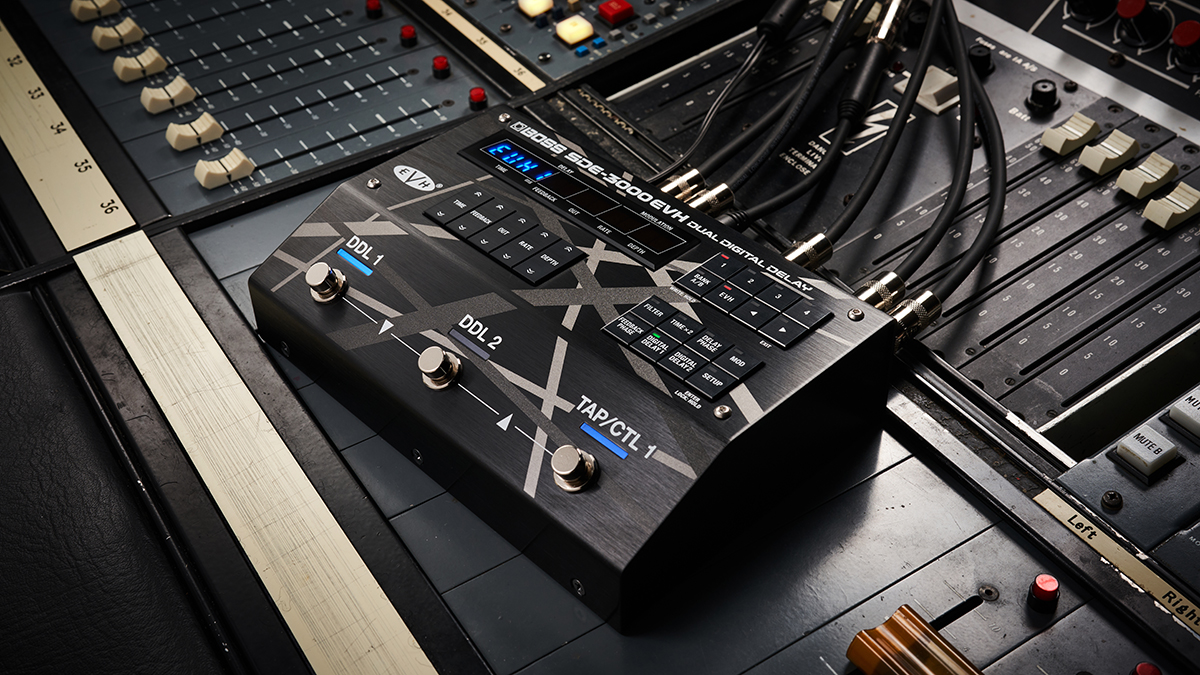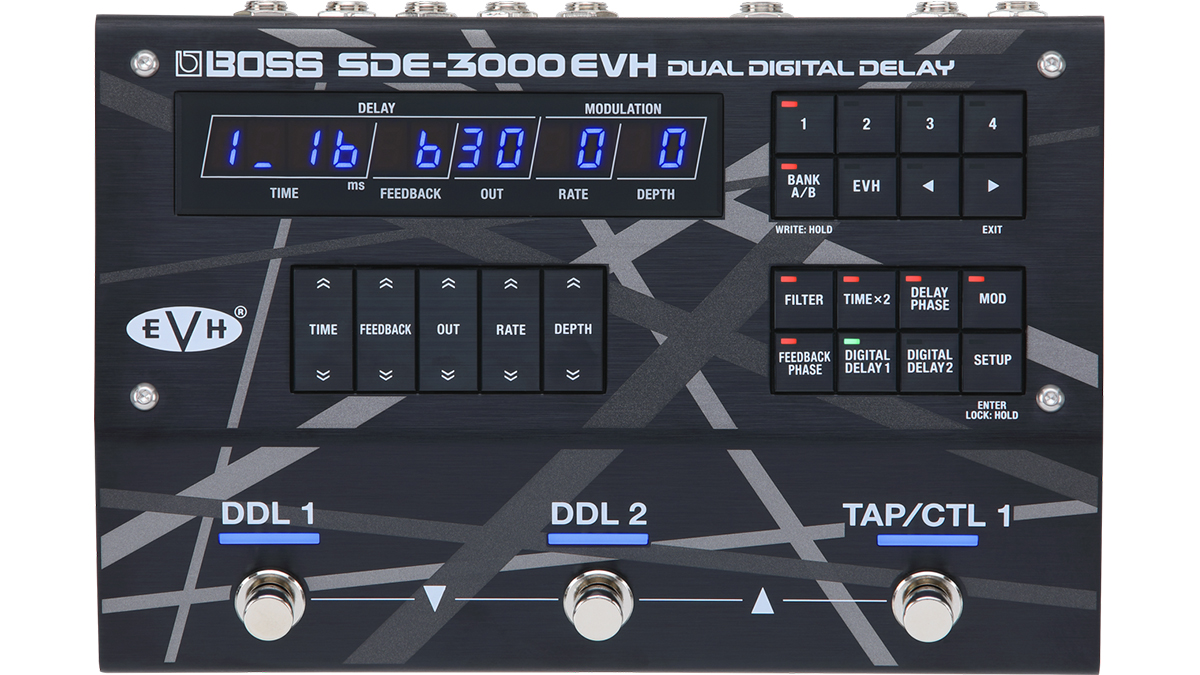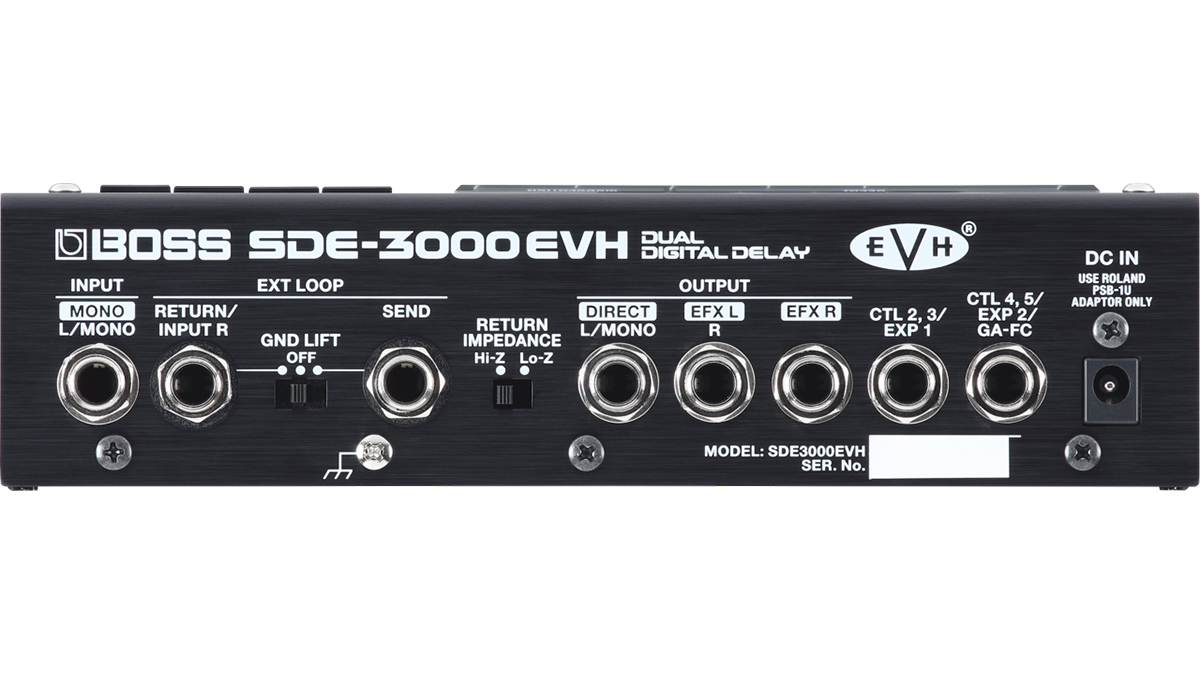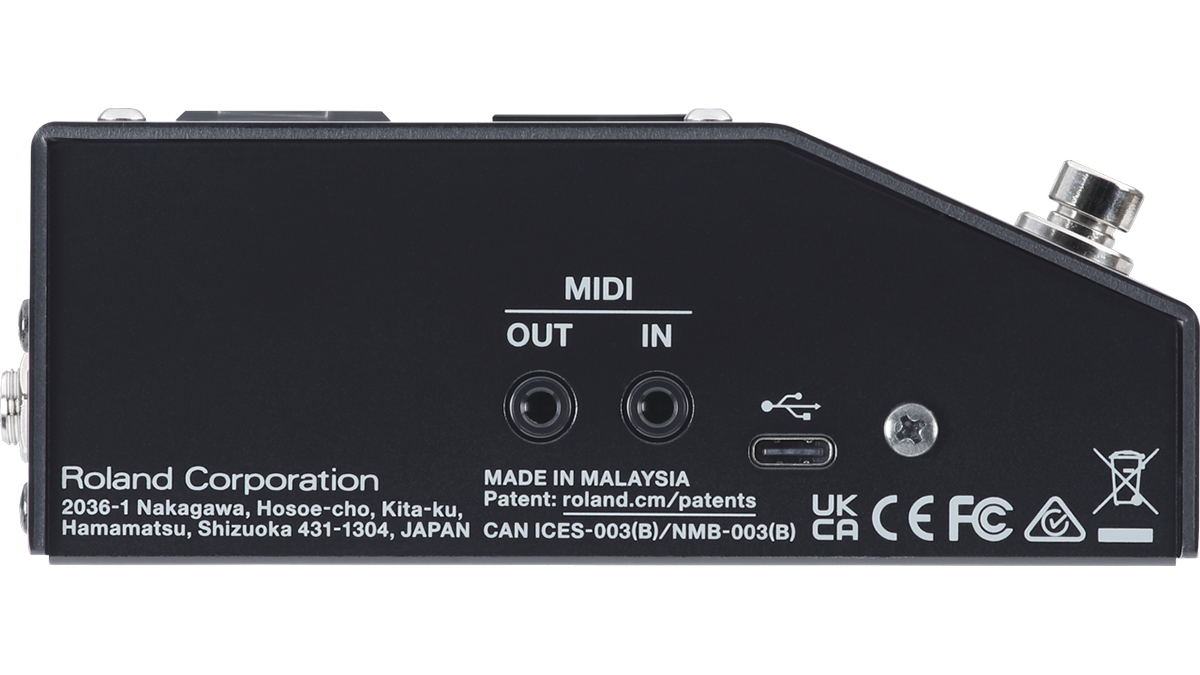
Eddie Van Halen never stopped using his pair of Roland SDE-3000 digital delays ever since he first installed them in his stage rack in 1985.
His SDE-3000s played a crucial role in his mammoth sound, first in a stereo setup in the ’80s and from the early ’90s onward, as part of a wet/dry/wet rig he innovated, which employed a dry signal in the center and a mix of dry/delay processed signals on the left and right. This gave Van Halen's guitar a huge, reverb-like spread and depth without sacrificing an atom of punch, clarity or definition.
Anyone who has attempted to configure a wet/dry/wet rig like Ed’s knows it can be an expensive proposition involving reactive load boxes and speaker-to-line level converters.
Fortunately, about eight years ago Ed and his expert team at EVH joined forces with Boss to start development on the SDE-3000EVH Dual Digital Delay pedal, which combines a pair of SDE-3000 delays with an ingenious set of features that significantly simplify a wet/dry/wet rig for studio and stage applications.
Features

Boss released the SDE-3000EVH at the same time as the less expensive SDE-3000D, so I’ll first cover the differences that the extra $100 investment provides. The rear panel features numerous additional jacks, including Direct, EFXL and EFXR 1/4-inch output jacks that facilitate a wet/dry/wet setup and an EFX Loop for using the dry amp’s preamp to drive all three wet/dry/wet outputs for optimal tone.
The loop section also includes ground lift and return impedance switches, plus a noise suppressor with adjustable threshold and release parameters. Three ground lift cables are included for eliminating hum that can occur when using three separate amps together.
And finally, the pedal has an EVH preset button that accesses eight exclusive non-rewritable presets actually used by Ed – long, medium and short “reverb” and medium mono delays configured in separate sets for wet/dry/wet and stereo rigs.
The EVH pedal perfectly matched the world-class delays that made the 3000 a perennial favorite of guitarists and studio pros
The top panel will look very familiar to users of original SDE-3000 units as it has the same Time, Feedback, Out, Rate and Depth up/down buttons, square Bank A/B, Memory 1-4, Filter, Time x2, Delay Phase, Mod and Feedback Phase switches and Back to the Future-style alpha-numeric LED display that glows brilliant blue.
New additions include a Setup switch for accessing deeper parameter settings and individual access switches for Delay 1 and 2. Two footswitches allow users to engage Delay 1 and/or 2 in Manual Mode or select or bypass a pair of presets in Memory mode.
A Tap Tempo footswitch is also included. A pair of 1/4-inch control jacks enable the connection of various footswitch and pedal controllers, and MIDI In, Out and USB jacks are located on the side panel.
Performance
Since I own an original SDE-3000 unit from the early ’80s, I had to do an A/B comparison. After carefully tweaking optimal input and output levels on the rack unit and pedal, selecting the correct modulation waveforms and filter characteristics and making other adjustments to ensure all of the finer settings were identical, I truly could not tell the difference – the EVH pedal perfectly matched the world-class delays that made the 3000 a perennial favorite of guitarists and studio pros.
Beware of online video demos that suggest otherwise. The new pedal goes significantly above and beyond the original 3000 with powerful additional features, like sine wave modulation (in addition to the original’s triangle wave only) and user programmable low- and high-cut filters for the Filter section, so some of the deeper settings can be quite different from the original. Users should take time and carefully read the manual to familiarize themselves with the various expanded parameters.


Memory mode is great for quickly toggling between two settings or bypassing the effect. Manual mode is best for programming or live applications like engaging each delay individually.
The delays can lock to an external clock via MIDI, switch between millisecond or bpm tempo displays and be set to any of 13 different note values like dotted eighth, half and whole notes. Whereas the original unit stored only eight presets, the pedal provides 100 memory locations.
The wet/dry/wet configuration using the four-cable method/EFX loop setup with three amps sounds simply majestic with the corresponding EVH presets and beyond. The delay tails are richly detailed and lush – to this day the sound quality of the SDE-3000 remains the standard to beat. Using both delays to program chorus and flanger effects can generate lush, complex textures that competing digital delay units in its price range can’t match.
Specs
- PRICE: $599 / £539
- TYPE: Digital delay
- FEATURES: Eight EVH presets with same settings from the two SDE-3000 delays in Eddie Van Halen's live rig, adjustable noise suppressor, phase switches, adjustable low-cut and high-cut filters, assignable onboard footswitch control for tap tempo, hold, etc., MIDI I/O, two delay time range settings (0–1500 ms and 0–3000 ms), modulation, effects loop
- CONTACT: Boss







